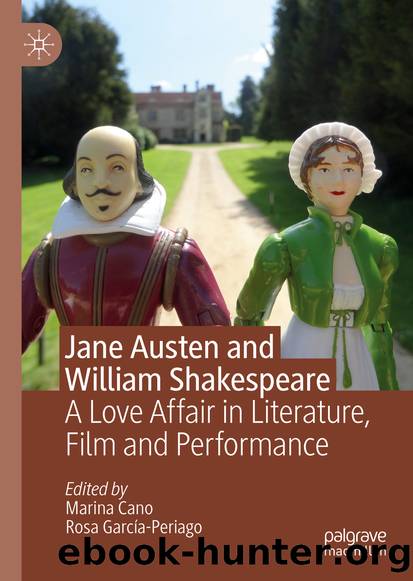Jane Austen and William Shakespeare by Unknown

Author:Unknown
Language: eng
Format: epub
ISBN: 9783030256890
Publisher: Springer International Publishing
The Ghost proclaims that Claudius has taken his life and right to rule, but âmost horribleâ of all is the taking of his wife Gertrude, for his brother must have her to be king. As Claudius remarks earlier to the assembled council of the court, âNor have we herein barred / Your better wisdoms, which have freely gone / With this affair alongâ (1.2.15â16). He claims the council has wisely approved of his marrying his dead brotherâs wife and that the court has the authority to sanction the marriage. There is no mention of any special religious dispensation required for this marriage between brother and sister-in-law, but, due to the actions of Henry VIII, Shakespeareâs audience would have been aware that such a union was forbidden. As Jason Rosenblatt has pointed out, âat certain moments in Hamlet the imagined world of the play seems to shade into the real world of Shakespeareâs Englandâ.13 In Hamlet, incest is a controversial tool of power to be wielded. In the case of Claudius and Gertrude, it represents moral and political depravity, as well as a specific crime. Prince Hamlet emphasizes that the incest of the King and Queen symbolizes virtue subjected to vice. The Ghost also warns that the kingdom will be tainted: âLet not the royal bed of Denmark be / A couch for luxury and damned incestâ (1.5.82â3).
While there is a sense of revulsion in Hamlet as regards in-family marriage, the sentiment in Austen is markedly different. The distinction between the two authors resides in in-family marriage purely in pursuit of political power and ambition versus incest to maintain the sanctity of the family. In other words, the difference is based on moral grounds: in-family marriage as self-promotion is to be despised in Hamlet, whereas in-family marriage as familial defence is viewed favourably in Austen. But while in-family alliances between certain characters in Austen (such as the virtuous Fanny and Edmund in Mansfield Park) are viewed with great approbation, others are presented negatively. As Ruth Perry notes, paternal first-cousin marriages in Austenâs fiction, such as those of Colonel Brandonâs brother to the older Eliza in Sense and Sensibility and Mr. Elliotâs desire to marry his cousin Anne in Persuasion , have implications for inheritance. Because of the weighting of wealth and title for the male line, these marriages are considered as being potentially blighted by social ambition and greed.14 As is the case in Shakespeareâs Hamlet, Austen disapproves of in-family unions that are made solely for the sake of profit and status . She looks more favourably upon in-family marriages stemming from character that serve and reinforce the moral well-being of the family.
As far as the topic of incest goes, the presence of embedded plays is one of the most obvious parallels between Shakespeareâs Hamlet and Austenâs Mansfield Park. In Hamlet, the in-family marriage motif is reinforced by the play-within-the-play, âThe Mousetrapâ, in which Lucianus murders his king and uncle, Gonzago, so that he may marry Gonzagoâs wife and usurp the throne.
Download
This site does not store any files on its server. We only index and link to content provided by other sites. Please contact the content providers to delete copyright contents if any and email us, we'll remove relevant links or contents immediately.
Cecilia; Or, Memoirs of an Heiress — Volume 2 by Fanny Burney(31956)
Cecilia; Or, Memoirs of an Heiress — Volume 3 by Fanny Burney(31942)
Dialogue by Robert McKee(4405)
The 101 Dalmatians by Dodie Smith(3511)
Bound by Hatred (The Singham Bloodlines Book 2) by MV Kasi(3086)
The Art of Dramatic Writing: Its Basis in the Creative Interpretation of Human Motives by Egri Lajos(3068)
Harry Potter and the Cursed Child - Parts One and Two by John Tiffany(3046)
The Beautiful Boys: A High School NA Reverse Harem Paranormal Bully Romance (Shadowlight Academy Book 1) by Gow Kailin(2868)
Angels in America by Tony Kushner(2662)
Carrie's War by Nina Bawden(2469)
A Clockwork Orange by Anthony Burgess(2468)
Unlaced by Jaci Burton & Jasmine Haynes & Joey W. Hill & Denise Rossetti(2375)
The Femme Playlist & I Cannot Lie to the Stars That Made Me by Catherine Hernandez(2293)
Open Book by Jessica Simpson(2267)
Drama by John Lithgow(2235)
Outside Woman (BWWM Amish Romance) by Stacy-Deanne(2121)
Terrorist Cop by Mordecai Dzikansky & ROBERT SLATER(2080)
Yerma by Federico García Lorca(2071)
Leo's Desire by Sundari Venkatraman(1932)
